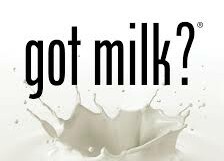National Milk Day Part 2

Milk has an impressive nutritional profile. By design, it is meant to nourish newborn animals, so it has to be full of many beneficial components. Milk is an excellent source of vitamins and minerals, including “nutrients of concern,” which are under-consumed by many populations.
It provides potassium, B12, calcium and vitamin D, which are lacking in many diets. Milk is also a good source of vitamin A, magnesium, zinc and thiamine (B1). Additionally, it’s an excellent source of protein and contains hundreds of different fatty acids, including conjugated linoleic acid (CLA) and omega-3s. Conjugated linoleic acid and omega-3 fatty acids are linked to many health benefits, including a reduced risk of diabetes and heart disease.
The nutritional content of milk varies, depending on factors like its fat content and the diet and treatment of the cow it came from. For example, milk from cows that eat mostly grass contains significantly higher amounts of conjugated linoleic acid and omega-3 fatty acids. Also, organic and grass-fed cow’s milk contains higher amounts of beneficial antioxidants, such as vitamin E and beta-carotene, which help reduce inflammation and fight oxidative stress.
It is widely known that milk is a rich source of protein. Just one cup contains 8 grams of clean protein. Protein is necessary for many vital functions in your body, including growth and development, cellular repair and immune system regulation. Milk is considered a “complete protein,” meaning it contains all nine of the essential amino acids necessary for your body to function at an optimal level.
There are two main types of protein found in milk — casein and whey protein. Both are considered high-quality proteins. Casein makes up the majority of the protein found in cow’s milk, comprising 70–80% of the total protein content. Whey accounts for around 20%. Whey protein contains the branched-chain amino acids leucine, isoleucine and valine, all of which are linked to health benefits.
Research suggests that consuming milk can be especially beneficial for seniors. Drinking milk is associated with a lower risk of age-related muscle loss in several studies. Branched-chain amino acids may be particularly helpful in building muscle, preventing muscle loss and providing fuel during exercise. In fact, higher consumption of milk and milk products has been linked to greater whole-body muscle mass and better physical performance in older adults.
Drinking milk has long been associated with healthy bones. This is due to its powerful combination of nutrients, including calcium, phosphorus, potassium, protein and (in grass-fed, full-fat dairy) vitamin K2. All of these nutrients are essential for maintaining strong, healthy bones. Milk is an excellent source of the nutrients your body relies on to properly absorb calcium, including vitamin D, vitamin K, phosphorus and magnesium.
Another reason why drinking milk is important for seniors is because adding milk and dairy products to your diet may prevent bone diseases like osteoporosis. Studies have linked milk and dairy to a lower risk of osteoporosis and fractures, especially in older adults. Evidence suggests that eating more protein may protect against bone loss, especially in women who do not consume enough dietary calcium.
Milk can be an excellent choice for elderly folks who have trouble swallowing solid foods. It provides plenty of nutrients, while being easy to consume. Also, sometimes older adults lose weight due to health conditions or from the natural process of aging (in later years people’s appetites tend to decrease). Milk is a great go-to to help with this. Whole milk can help promote weight gain in a healthy way due to its higher fat content and high level of nutrients.
So raise a glass of milk to this nutrient-rich beverage! Private Home Health Care encourages you to drink your serving of milk today, and don’t be shy about a milk mustache!
Posted in: Healthcare
Leave a Comment: (604) →